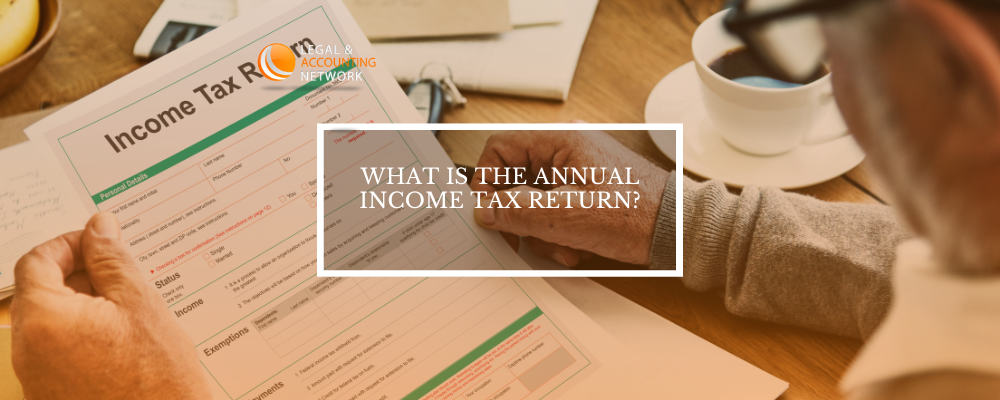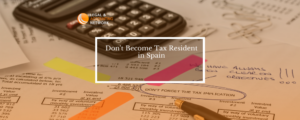The annual income tax return or IRPF (Impuesto sobre la Renta de las Personas Físicas) is an annual tax that Spanish tax residents must file between April and June each year, in order to declare the profits and/or income obtained during the immediately preceding tax year.
It is important to know that, in order to make the final calculations of the Income Tax Return, all income and expenses are divided into two main categories, from which we will obtain: the General Taxable Base and the Savings Taxable Base. The reductions applicable in each case will be subtracted from these two bases, after which we will obtain the Taxable Base, to which the progressive percentages approved by the Government are applied in each case to obtain the final tax calculation. For the year 2022 the General Tax Base has 6 different brackets (from 19% to 47% between 12.450€ and over 300.000€) and the Savings Tax Base has 4 brackets (from 19% to 26% between 6.000€ and over 200.000€). After carrying out these calculations, we can take into account certain deductions, withholdings and payments on account that may be applicable in order to obtain the final figure to be paid or refunded.
As indicated above, income tax is a direct and progressive tax, i.e. the tax rate increases as the taxpayer’s income increases. This measure is intended to ensure that the income tax return has a redistributive effect on income, so that the tax paid is in line with the taxpayer’s purchasing power: “those who have the most pay the most”.
Moreover, it should be borne in mind that the percentage is not applied to the total of the bases, but to the base corresponding to each bracket until the total net income of each taxpayer is reached. Therefore, the tax payable will be made up of several percentages.
HOW ARE THE BASES CALCULATED TO DETERMINE THE FINAL TAX PAYABLE?
To obtain this information, both gross income and tax-deductible expenses must be taken into account.
The General Tax Base includes income received through a salary (employees), income obtained as a self-employed person (self-employed), as well as income from public benefits, such as pensions, temporary disability, maternity leave, etc. Capital gains and losses not derived from the sale of properties (rental housing, deemed income, sale of shares, etc.) are also covered.
On the other hand, the Savings Tax Base takes into account income derived from certain investments (shares, deposits, investment funds, etc.), capital income (dividends, interest, etc.) as well as capital gains and losses originated from the sale of property.
WHAT DO I HAVE TO TAKE INTO ACCOUNT FOR MY TAX RETURN?
REDUCTIONS
The reductions are applied before obtaining the taxable base; therefore, the amount of the reductions “reduces” the base for the calculation of the final tax. We can consider the following reductions, always taking into account the limits and requirements established in each case:
- For joint tax returns
- For contributions to pension plans
- For contributions to the protected estates of disabled persons
- Alimony and child maintenance allowances
- Contributions to the mutual insurance fund for professional sportsmen and sportswomen
DEDUCTIONS
Deductions are applied to the calculation of the tax obtained from the taxable base, therefore, the amount of the deductions will be “deducted” from the amount to be paid or will “increase” the amount of the refund, as applicable in each case. The following are some of the most important state deductions to which special limitations and requirements apply:
- Investment in main dwelling (limited to dwellings purchased before 1 January 2013)
- Investment in a new or newly created company
- Deductions for incentives and stimuli for business investment applicable to economic activities in direct estimation.
- Deduction for investment in new tangible fixed assets or real estate investments used for business activities
- Deductions for donations and other contributions
- Deduction for actions for the protection and dissemination of Spanish Historical Heritage and World Heritage
- Deduction for certain income obtained in Ceuta and Melilla,
- Special regimes of deductions for economic activities carried out in the Canary Islands
- Deduction for renting the main residence.
- Maternity deduction (children under 3 years of age)
In addition to the state deductions, each autonomous region approves specific deductions that will be taken into account depending on the autonomous region of residence. The most important ones for the Autonomous Community of Andalusia are detailed below:
- For birth, adoption or fostering
- For single-parent families and cohabitation with people over 75 years of age
- Taxpayer or spouse with a disability
- Large family
- For domestic help and/or assistance to persons with disabilities
- Investment in protected permanent housing and by young people
- For renting the usual dwelling.
- For donations for environmental purposes
- Acquisitions of shares
- Legal fees for labour matters
- Expenditure for language or IT lessons
WITHHOLDINGS AND PAYMENTS ON ACCOUNT
Depending on how the income is obtained, it may be the case that the taxpayer, or someone on their behalf, has made payments on account of the Income Tax Return. This is a very common case for taxpayers who receive income through a payroll, in which case the paying company usually makes withholdings on the payroll, or the well-known self-employed who make quarterly payments on account according to the net profit obtained at the end of each quarter from the beginning of the financial year. These amounts, as in the previous case, will “reduce” the amount to be paid or “increase” the amount of the refund.
WHO IS OBLIGED TO FILE A TAX RETURN?
Although we have previously stated that the income tax return must be filed by tax residents in Spain, there are certain requirements that oblige or exempt certain taxpayers from filing it. The following are the taxpayers who are OBLIGATED to file the income tax return
- Taxpayers with total income from work exceeding €22,000, except those from more than one payer, in which case the limit is reduced to €14,000, provided that the amount received by the second payer does not exceed €1,500. Otherwise, the limit remains €22,000.
- The limit will remain at €22,000 provided that the following circumstances do not apply, in which case the limit will be €14,000
- The payer is not obliged to withhold taxes as source
- Pensioners with several pensions whose deductions are not made according to the Tax Office regulations
- When non-exempt alimony payments or child maintenance allowances are paid
- When receiving full income from employment subject to a fixed withholding tax rate
- Taxpayers who own a property other than their usual dwelling and whose deemed income exceeds €1,000 per year.
- Taxpayers who carry out an economic activity (self-employed) in the event that the total income, together with income from work, capital and capital gains, exceeds €1,000 per year.
- Taxpayers with capital losses of more than €500 per year.
- Taxpayers who are owners of rented properties whose total income from movable capital, economic activities and capital gains exceeds €1,000 per year.
- Taxpayers who receive the “minimum living income” (ingreso mínimo vital), as well as all persons living with the taxpayer.
- Taxpayers who have the right to apply the deduction for investment in usual dwelling, the deduction for double international taxation or who have made contributions. If they fail to file a tax return in any year, they will lose the right to future deductions.
All in all, the income tax return is a complex calculation that takes into account both the taxpayer’s income and expenses, as well as other significant data, to determine the annual personal tax. It is advisable to have the expertise of a tax advisor to guide and advise us in order to avoid possible disputes with the Tax Office, which has 4 years to review our declarations.







